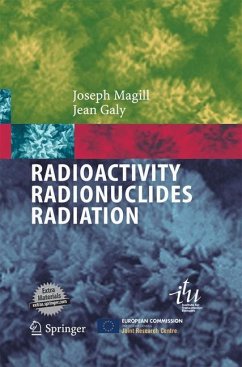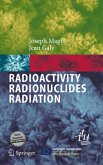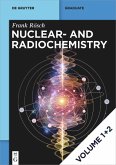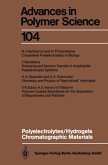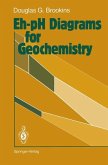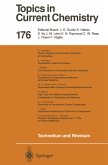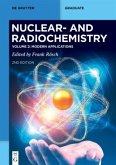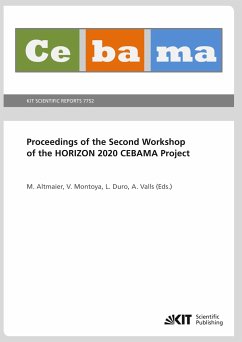RADIOACTIVITY - RADIONUCLIDES - RADIATION is suitable for a general audience interested in topical environmental and human health radiological issues such as radiation exposure in aircraft, food sterilisation, nuclear medicine, radon gas, radiation dispersion devices ("dirty bombs")... It leads the interested reader through the three Rs of nuclear science, to the forefront of research and developments in the field. The book is also suitable for students and professionals in the related disciplines of nuclear and radiochemistry, health physics, environmental sciences, nuclear and astrophysics. Recent developments in the areas of exotic decay modes (bound beta decay of 'bare' or fully ionized nuclei), laser transmutation, nuclear forensics, radiation hormesis and the LNT hypothesis are covered.
Atomic mass data for over 3000 nuclides from the most recent (2003) evaluation are included.
Atomic mass data for over 3000 nuclides from the most recent (2003) evaluation are included.
From the reviews:
"Here is a book suitable for second-year university ... . is wonderfully up to date, with references right up to 2004, the year of publication. And it is not just the references - the emphasis in each chapter is on the latest progress ... . a good glossary, a fold-out Karlsruhe table of nuclides, a 30-page table of atomic masses . ... These features make the book a very useful ... . Great value" -- Colin Keay, The Physicist Australian Institute of Physics, Vol. 42 (1), 2005
"This will be an excellent source of information for those who want to become acquainted with the characteristics of radioactivity, radionuclides and radiation. ... Stated briefly, compliments are due to the authors of this excellent publication, ... This book should be present in every nuclear medicine department." -- E. K. J. Pauwels, European Journal of Nuclear Medicine and Molecular Imaging, Vol. 32 (5), 2005
"Magill (European Commission) provides readers with a fascinating blend of nuclear history, scientific principles, and applied nuclear technology. ... Each chapter is packed with diagrams, photographs, tables of data, clear explanations, and numerous examples, all of which are potent information resources for someone who desires to learn a few specifics or for one who wants to really learn or review nuclear physics concept and details. ... Summing Up: Highly recommended. Lower-division undergraduates through professionals; two-year technical program students." -- F. Potter, Choice, Vol. 42 (10), 2005
"This new book deals with the basic properties of radioactivity, its occurrence in nature and the environment and its applications. ... The nine chapters are followed by an extensive list of references, weblinks and suggestions for further readings. ... This book is suited for a general audience interested in radioactivity in our daily life ... . It is very practice minded, and in this way it is also very useful for students and researchers in the field of nuclear physics and related disciplines." -- Cyriel Wagemans, European Journal of Nuclear Medicine and Molecular Imaging, Vol. 32 (5), 2005
"Here is a book suitable for second-year university ... . is wonderfully up to date, with references right up to 2004, the year of publication. And it is not just the references - the emphasis in each chapter is on the latest progress ... . a good glossary, a fold-out Karlsruhe table of nuclides, a 30-page table of atomic masses . ... These features make the book a very useful ... . Great value" -- Colin Keay, The Physicist Australian Institute of Physics, Vol. 42 (1), 2005
"This will be an excellent source of information for those who want to become acquainted with the characteristics of radioactivity, radionuclides and radiation. ... Stated briefly, compliments are due to the authors of this excellent publication, ... This book should be present in every nuclear medicine department." -- E. K. J. Pauwels, European Journal of Nuclear Medicine and Molecular Imaging, Vol. 32 (5), 2005
"Magill (European Commission) provides readers with a fascinating blend of nuclear history, scientific principles, and applied nuclear technology. ... Each chapter is packed with diagrams, photographs, tables of data, clear explanations, and numerous examples, all of which are potent information resources for someone who desires to learn a few specifics or for one who wants to really learn or review nuclear physics concept and details. ... Summing Up: Highly recommended. Lower-division undergraduates through professionals; two-year technical program students." -- F. Potter, Choice, Vol. 42 (10), 2005
"This new book deals with the basic properties of radioactivity, its occurrence in nature and the environment and its applications. ... The nine chapters are followed by an extensive list of references, weblinks and suggestions for further readings. ... This book is suited for a general audience interested in radioactivity in our daily life ... . It is very practice minded, and in this way it is also very useful for students and researchers in the field of nuclear physics and related disciplines." -- Cyriel Wagemans, European Journal of Nuclear Medicine and Molecular Imaging, Vol. 32 (5), 2005

